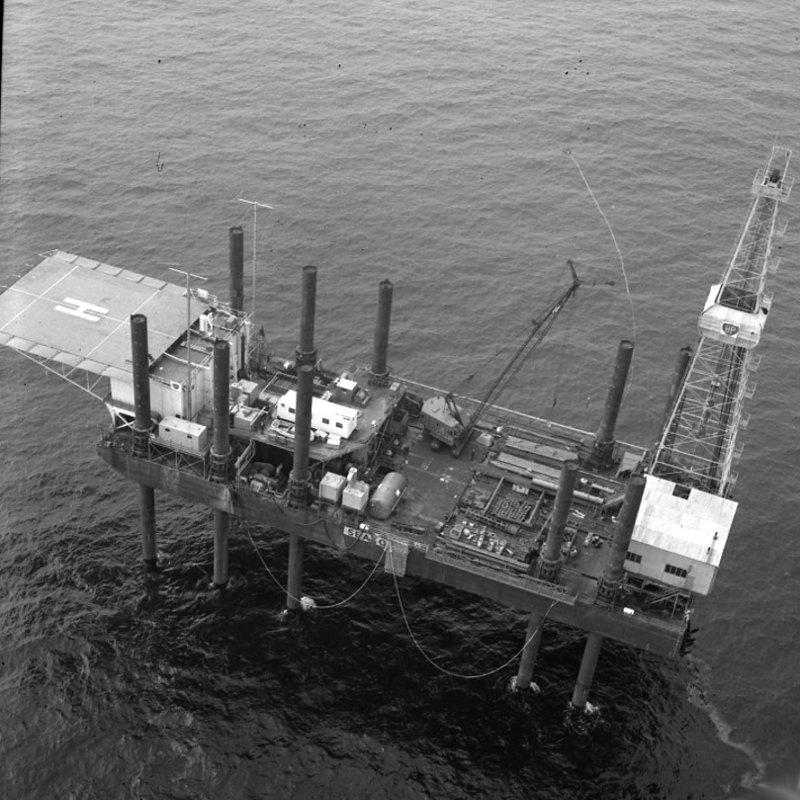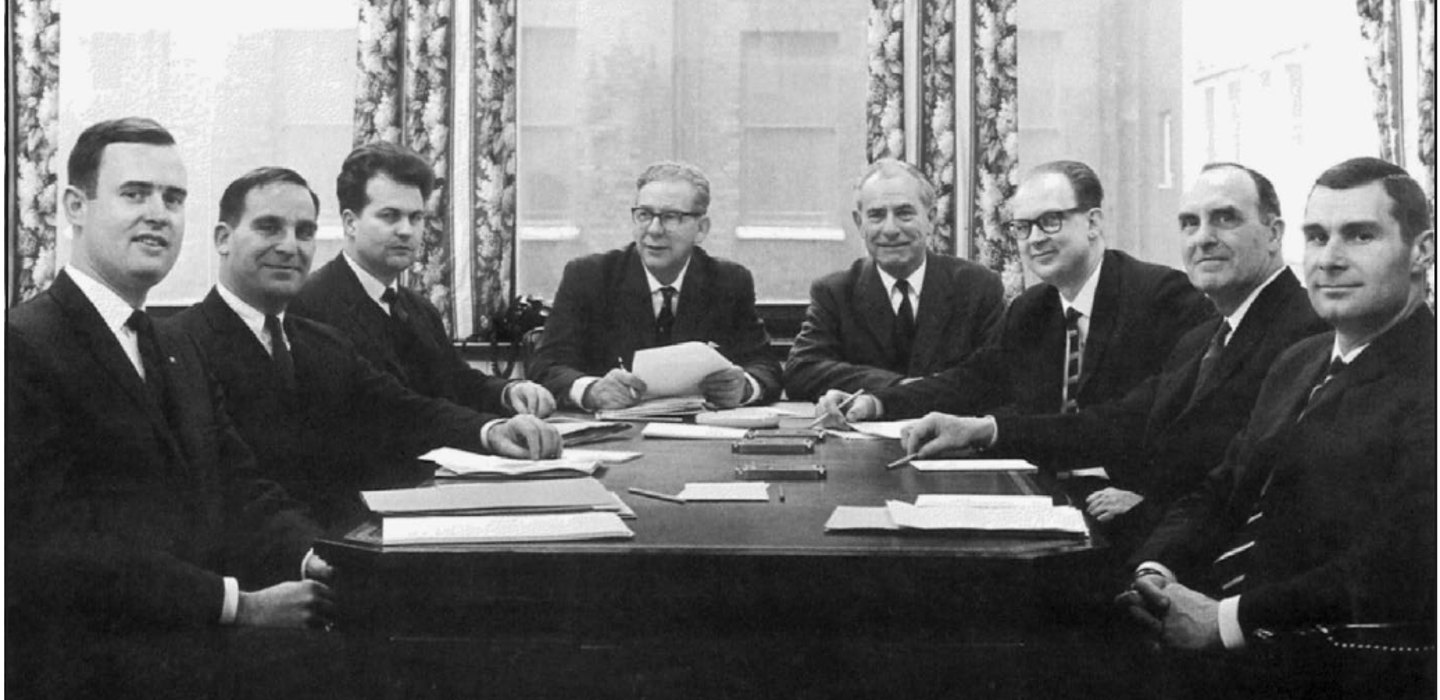 The Sea Gem, a converted barge, made the first hydrocarbon discovery on the UKCS, at West Sole in 1965. (Source: BP)After the discovery of the giant Groningen Field onshore The Netherlands in 1959 (see GEO ExPro Vol. 6, No. 4), geologists’ eyes began to turn westwards, wondering if these amazing reservoirs could extend beyond the coastal boundary, under the North Sea and into British waters. And sure enough, after a few seismic surveys and some hasty law-making to define the United Kingdom Continental Shelf (UKCS), it was not long before the first British gas field was found – West Sole, discovered in September 1965.
The Sea Gem, a converted barge, made the first hydrocarbon discovery on the UKCS, at West Sole in 1965. (Source: BP)After the discovery of the giant Groningen Field onshore The Netherlands in 1959 (see GEO ExPro Vol. 6, No. 4), geologists’ eyes began to turn westwards, wondering if these amazing reservoirs could extend beyond the coastal boundary, under the North Sea and into British waters. And sure enough, after a few seismic surveys and some hasty law-making to define the United Kingdom Continental Shelf (UKCS), it was not long before the first British gas field was found – West Sole, discovered in September 1965.
Equally rapidly, the geoscientists working in the North Sea realized that they were sorely in need of data, reference material and sources of general information, not just about the geology, but also of the experience of searching for oil in such a hostile environment. The first well in the North Sea was spudded in December 1964, and in the same month about 40 oil industry professionals held a meeting in the Westbury Hotel in the center of London to discuss the formation of a professional society concerned solely with the geology and geophysics of hydrocarbons in the North Sea; these guys were certainly not hanging around! The majority of the attendees had been exploring for oil overseas, and many had been active in societies such as the American Association of Petroleum Geologists and saw the importance of such organizations for information gathering and sharing. The delegates decided to form a new society, to be called the Petroleum Society of Great Britain – the PESGB was born.
Rapid Growth
At this first meeting a few simple objectives for the society were outlined. Monthly meetings would be held, providing a forum for explorationists to meet and where eminent speakers would be invited to lecture on geoscience and the geology of the North Sea, with the new society stressing that it was keen to encourage involvement from academia and the service industry as well as oil companies. To encourage frank discussions, and save costs, the talks would not be published. They also determined that membership fees would be kept at a minimum to encourage all to join, and that it would be run by a volunteer council, elected by the members. Companies involved in oil and gas were also encouraged to become sustaining members of the organization, and there are now about 80 companies of all shapes and sizes registered in this capacity.
Having formed the society, they lost no time in getting active. The first evening lecture meeting was held in January 1965 in London, although there is no record of the topic or speaker. These soon developed into a monthly feature, and Aberdeen-based lectures were introduced in 1984; to date the society estimates that it has hosted nearly 800 evening lectures.
Being an organization primarily consisting of geologists, field trips were naturally high on the agenda. The first one was conducted in 1965 along the Devon and Dorset coast, to be followed by over 180 more so far, to destinations as varied as Svalbard and South Africa, as well as classic UK locations.
From the 40 original delegates at the first meeting in 1964, the membership had grown to 224 members, four honorary members and 18 sustaining members by 1968, when the fees were £1 for members and £10 for sustaining members. Just five years later, membership had doubled to 500 – and so had the annual membership fee, to £2.
To update members, membership directories and a newsletter were distributed. The latter was originally just couple of typewritten sheets, but by 1986 it had developed into the magazine with a range of features and articles that members now receive, which is also an important source of revenue through its advertising.
Conferences and Education
In addition to the evening lectures, the organization has built up a reputation for running high quality, pertinent conferences and seminars. These started with the 1974 Petroleum Geology of North West Europe Conference (the PESGB was one of four organizing bodies), which ultimately developed into the seminal series of events commonly known as the ‘Barbican Conferences’, held about every six years. The PESGB is also responsible for PETEX, the premier regular geoscience meeting in the UK, which it has been running biennially since 1989. Continually developing, the society has more recently added PROSPEX to the events list, held annually since the first ‘UK Prospect Expo’ in 2003.
Education was a keystone in the foundation of the PESGB, not only through lectures and conferences but more directly through courses. In 1981 the organization joined forces with the Geological Society of London and Imperial College to form the Joint Association for Petroleum Courses, which ran courses pertinent to exploration, given by a mix of academics and industry veterans. These ran until 2001, but in 2007 the idea was reintroduced by the PESGB alone, initially running the always popular ‘Introduction to North Sea Geology’ course. Since then it has organised several courses each year, covering topics ranging from ‘Geophysics for Geologists’ and ‘Sequence Stratigraphy’ to ‘Data Management’ and ‘Atlantic Margin Frontier Basins’.
A new development happened in 2008, when funds were allocated to sponsor students undertaking petroleum geoscience-related M.Scs, with seven students benefiting that first year, and 81 in total to date.
Onwards and Upwards
The PESGB has continued to evolve and grow through its 50-year history, but has remained close to those core objectives set out at the first meeting. In 1985, with 1,600 members and a new branch based in Aberdeen recently opened, the organization established a permanent office and staff; until then, it had been run entirely by volunteers. Always nonprofit-making, it is now a registered charity, with attendant financial benefits for both the society and its members.
But the most significant change is probably the way in which the organization has progressed from being inward-looking, working purely for the members, to being involved in outreach and general education beyond the O&G industry, promoting geoscience in schools and education, as well as the masters sponsorship program. The annual Bob Stonely lecture series is another example of outreach: open to all, it asks well-known people, not necessarily geologists, to explain the benefits and relevance to them of the scientific and technical aspects of petroleum exploration.
However, it is not all serious stuff. The members are a lively community, and the social and networking aspect has always been very a important and popular side to the PESGB, as can be testified by anyone who has gone on the euphemistically described ‘evening excursion’ (aka pub crawl) during PETEX.
So congratulations to the PESGB, keep up the good work and we look forward to the next 50 years!







